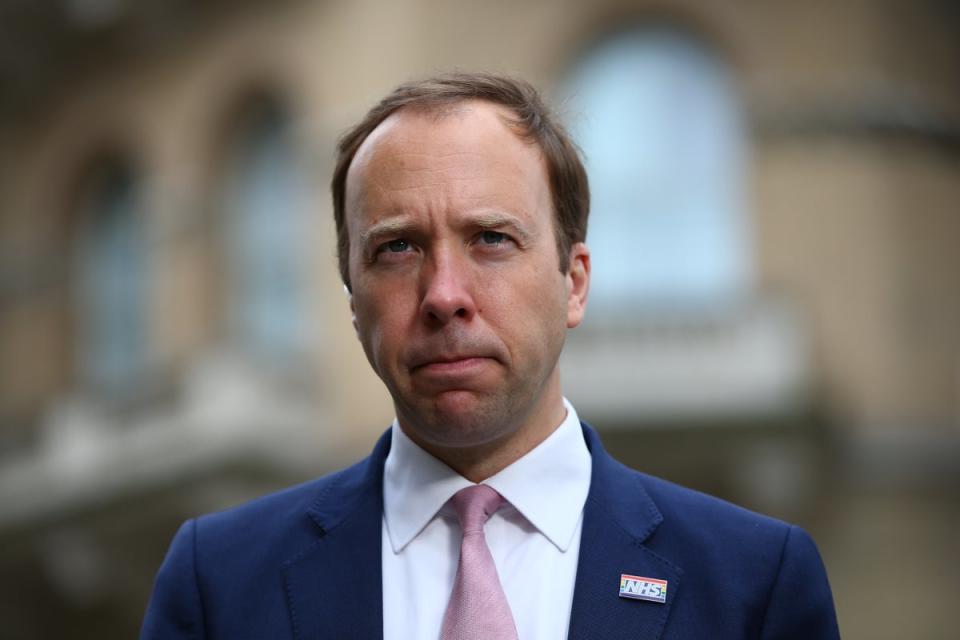Matt Hancock wanted to decide who should live and who should die during Covid – former NHS boss
- Oops!Something went wrong.Please try again later.
- Oops!Something went wrong.Please try again later.
Matt Hancock wanted to personally decide “who should live and who should die” if hospitals became overwhelmed at the height of the Covid pandemic, the former boss of the NHS has said.
In another day of explosive evidence at the official coronavirus inquiry, Simon Stevens said ministers were warned in February 2020 that as many as 840,000 people could perish – sparking the “unresolved but fundamental ethical debate” about who should be prioritised for NHS care.
In a shocking response, Mr Hancock, the then health secretary, argued that he – rather than doctors or the public – should decide who should be prioritised. Mr Hancock “took the position that in this situation he ... should ultimately decide who should live and who should die”, Lord Stevens told the hearing.
The bombshell claim follows a week of evidence that has revealed the chaos at the heart of government as Covid gripped the nation.
It came as:
Lord Stevens said senior ministers “sometimes avoided” the government’s emergency Cobra meetings chaired by Mr Hancock in the early days of the pandemic
He rebuffed Boris Johnson’s claim that “bed blocking” in the NHS was responsible for lockdown
The inquiry heard Mr Hancock told the former medical director of Public Health England (PHE) “not to patronise” him in the weeks leading up to the pandemic
The government’s former chief scientific adviser Patrick Vallance described the health department as “ungovernable” and an “operational mess” in his pandemic diaries
The fourth day in a row of dramatic testimony was the first to focus on Mr Hancock, who was forced to resign as health secretary after it was revealed he breached his own pandemic guidelines to carry on an affair with an aide.

He was later stripped of the Conservative whip when he appeared on the ITV show I’m a Celebrity Get Me Out of Here, and now sits as an independent in the House of Commons. Most recently he was branded a liar during a grilling on Channel 4 reality show Celebrity SAS: Who Dares Wins.
Lord Stevens, who led NHS England until 2021, said that despite Mr Hancock’s demand “this horrible dilemma never crystallised”.
The peer said he “wanted to discourage the idea that an individual secretary of state, other than in the most exceptional circumstances, should be deciding how care will be provided”.
After the evidence, former No 10 chief of staff Dominic Cummings launched yet another blistering attack on Mr Hancock, a day after his own grilling over his expletive-laden WhatsApp messages during the pandemic.
Mr Cummings asked on Twitter whether the true problem was either him “calling Hancock ‘a lying c*** killing people’” or “Hancock actually being a lying c*** killing people”.

Separately, during Lord Stevens’ evidence, a series of WhatsApp messages shared with the inquiry revealed that Mr Cummings repeatedly pushed Boris Johnson to sack Mr Hancock. At one stage, Mr Cummings claimed Mr Hancock had “lied his way through this and killed people and dozens and dozens of people have seen it”.
Lord Stevens was also shown messages between Mr Cummings and Mr Hancock from January and February 2020 which discussed moving him from his NHS post.
In one message, Mr Cummings complained about Lord Stevens and Mr Hancock “bulls***ting again”. “By the standard of Dominic Cummings, that is one of his gentler epithets,” Lord Stevens said.
He also told the inquiry that ministers “sometimes avoided” Cobra meetings chaired by Mr Hancock at the start of the pandemic, adding that they were “not optimally effective”. Asked if that was because of Mr Hancock, Lord Stevens said: “I am not saying that was cause and effect, but that was the fact of the matter.”
Professor Yvonne Doyle, former medical director of Public Health England, also told the inquiry she was also told “not to patronise” Mr Hancock after he was upset by an interview she did during the early days of the outbreak. She said Mr Hancock had “made his displeasure clear” and that she was advised to “keep a distance for a while until things settle down”.

But, rounding off a tumultuous week at the Covid inquiry, in which witnesses laid bare a macho, misogynistic, overconfident and chaotic culture in Downing Street during the pandemic, the Department of Health’s former top civil servant sought to defend Mr Hancock’s character.
Sir Christopher Wormald said he had been “surprised” by the extent to which senior officials mistrusted him. And while he recalled raising the complaints against Mr Hancock in one conversation with him, Sir Christopher said Mr Hancock would “overpromise” but was not a liar.
In his own testimony, Sir Christopher went on to say the government was a “week late” with all non-pharmaceutical interventions (NPIs) in the run-up to the first lockdown. He also said the subsequent November lockdown was implemented too late and that was his view at the time.
He added: "With hindsight, we were at least a week late at all points of the NPI decisions. I agreed with the decisions at the time and timing. But, looking back, we should have done each thing on the 12th, 16th, 23rd ... at least a week earlier."

